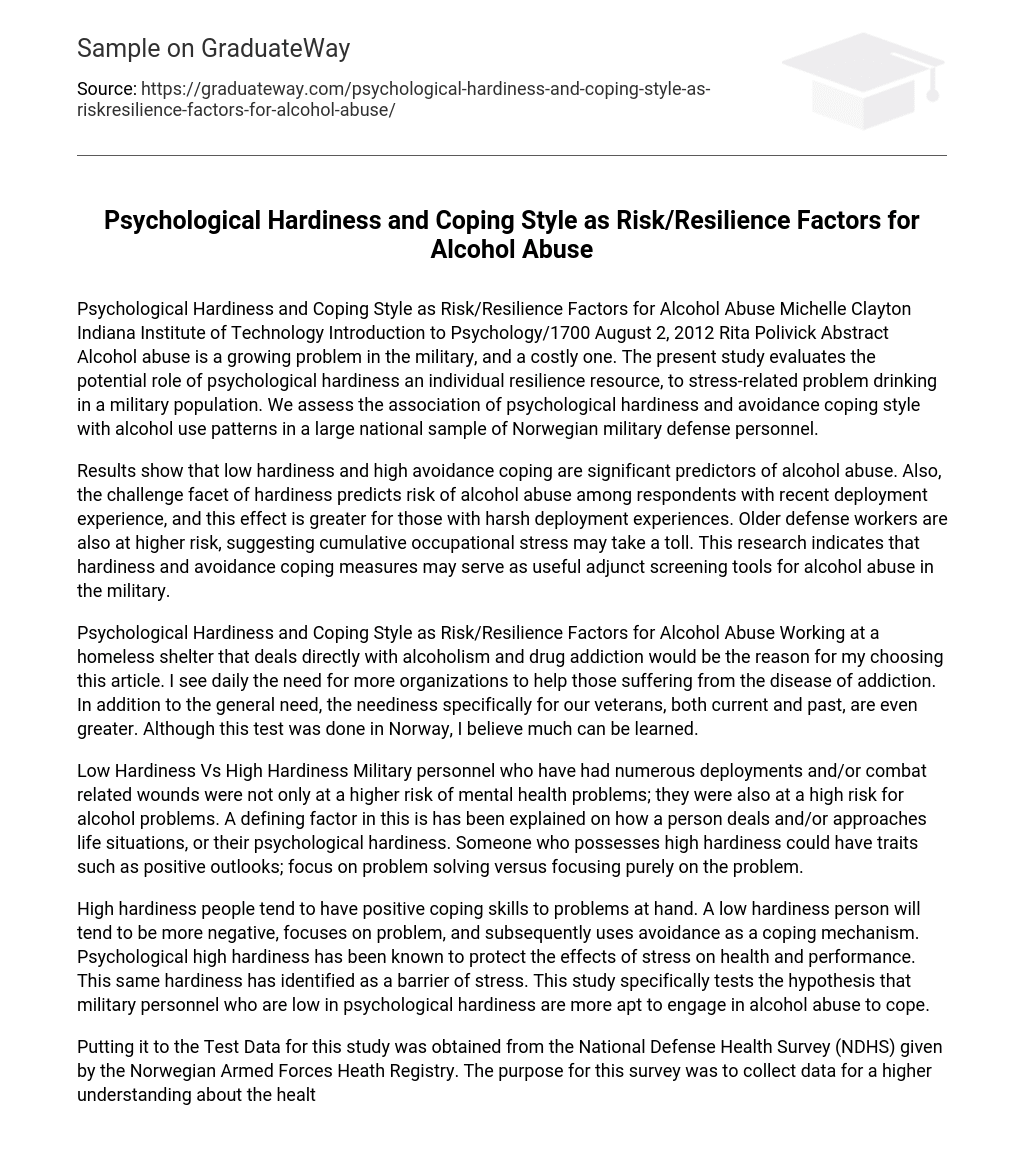Psychological Hardiness and Coping Style as Risk/Resilience Factors for Alcohol Abuse Michelle Clayton Indiana Institute of Technology Introduction to Psychology/1700 August 2, 2012 Rita Polivick Abstract Alcohol abuse is a growing problem in the military, and a costly one. The present study evaluates the potential role of psychological hardiness an individual resilience resource, to stress-related problem drinking in a military population. We assess the association of psychological hardiness and avoidance coping style with alcohol use patterns in a large national sample of Norwegian military defense personnel.
Results show that low hardiness and high avoidance coping are significant predictors of alcohol abuse. Also, the challenge facet of hardiness predicts risk of alcohol abuse among respondents with recent deployment experience, and this effect is greater for those with harsh deployment experiences. Older defense workers are also at higher risk, suggesting cumulative occupational stress may take a toll. This research indicates that hardiness and avoidance coping measures may serve as useful adjunct screening tools for alcohol abuse in the military.
Psychological Hardiness and Coping Style as Risk/Resilience Factors for Alcohol Abuse Working at a homeless shelter that deals directly with alcoholism and drug addiction would be the reason for my choosing this article. I see daily the need for more organizations to help those suffering from the disease of addiction. In addition to the general need, the neediness specifically for our veterans, both current and past, are even greater. Although this test was done in Norway, I believe much can be learned.
Low Hardiness Vs High Hardiness Military personnel who have had numerous deployments and/or combat related wounds were not only at a higher risk of mental health problems; they were also at a high risk for alcohol problems. A defining factor in this is has been explained on how a person deals and/or approaches life situations, or their psychological hardiness. Someone who possesses high hardiness could have traits such as positive outlooks; focus on problem solving versus focusing purely on the problem.
High hardiness people tend to have positive coping skills to problems at hand. A low hardiness person will tend to be more negative, focuses on problem, and subsequently uses avoidance as a coping mechanism. Psychological high hardiness has been known to protect the effects of stress on health and performance. This same hardiness has identified as a barrier of stress. This study specifically tests the hypothesis that military personnel who are low in psychological hardiness are more apt to engage in alcohol abuse to cope.
Putting it to the Test Data for this study was obtained from the National Defense Health Survey (NDHS) given by the Norwegian Armed Forces Heath Registry. The purpose for this survey was to collect data for a higher understanding about the health of the Armed Forces personnel. Another instrument used was the DRS-15R (Dispositional Resilience Scale). This scale which has continually improved over 25 years consists of 5 items each to measure control, commitment and challenge dimensions of hardiness.
The CSQ (Coping Style Questionnaire) was used to measure avoidance coping on a 4 point scale. CAGE (Cut down, Annoyed, Guilty, Eye-opener); a yes or no, 4 question self-test was used to measure alcohol use patterns. The demographics included sex of military personnel, age groups and total length and number of deployments. Findings There were no significant differences in personnel deployed in the past 3 years compared to personnel not deployed in past 3 years. In predicting the risk of alcohol abuse, age and hardiness were high deciding factors.
Those 50 years and older were at a lower risk than those 29 or younger. Those with low hardiness were at higher odds of abusing alcohol than those with higher hardiness. Studies showed that with every one point increase in hardiness scores there was an 8% decrease in odds of alcohol abuse; with every one point increase in avoidance coping scores, an 11% increase showed in odds for possibility of alcohol abuse. When basic needs were challenged, those low in hardiness risks rose however those high in hardiness numbers did not.
Conclusion For the most part I agree with the outcome of these findings. One major factor however in my opinion is the CAGE test. This being a self proclaimed test could lead to many false outcomes, depending on one’s age, honesty and willingness. Individuals may not be able to personally disclose this information accurately. In regards to hardiness, my predicition would be the same results would be found in non-military personnel as were military personnel.
I also believe that the more research we can do to facilitate the prescreening process of the military could relieve many from unnecessary suffering. I would like to have seen what the Norwegian Army offered as an answer for those who were suffering from alcoholism and the rate of success. However, that is probably a completely different study for a future time. References Bartone, Brevik, Eid, & Hystad (2012) Psychological Hardiness and Coping Style as Risk/Resilienc Factors for Alcohol Abuse. Military Medicine, 2012; 177: 517-524





